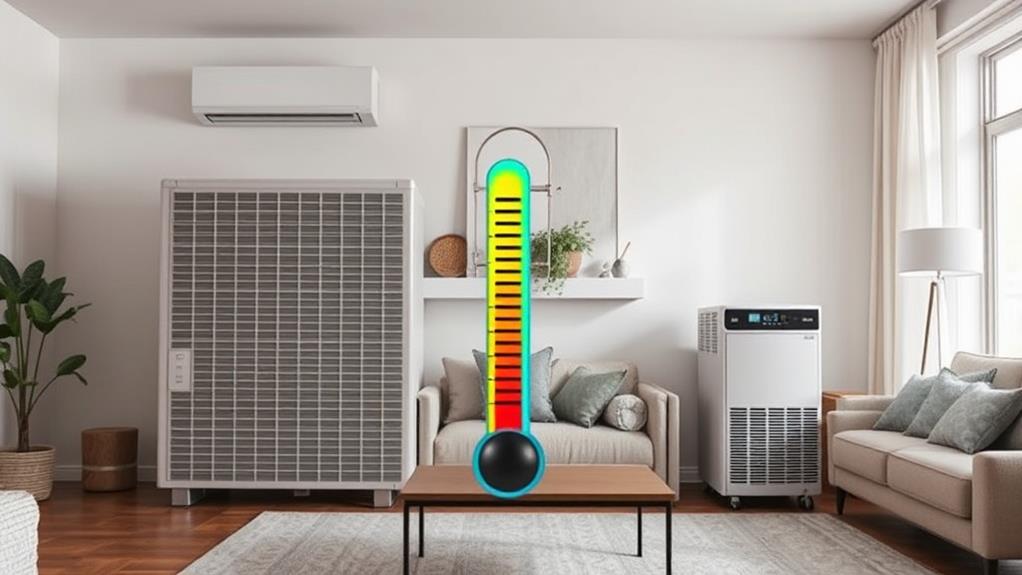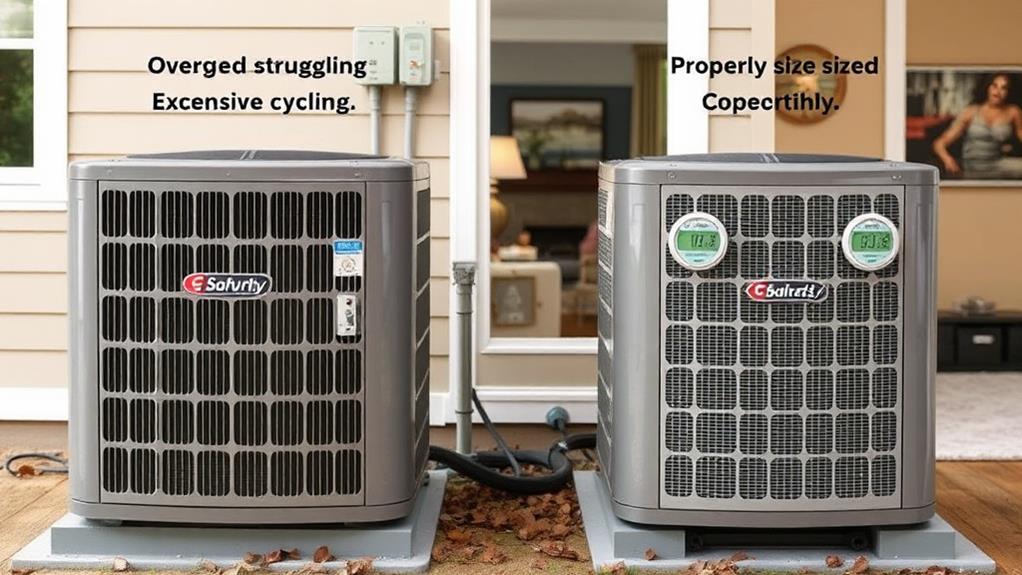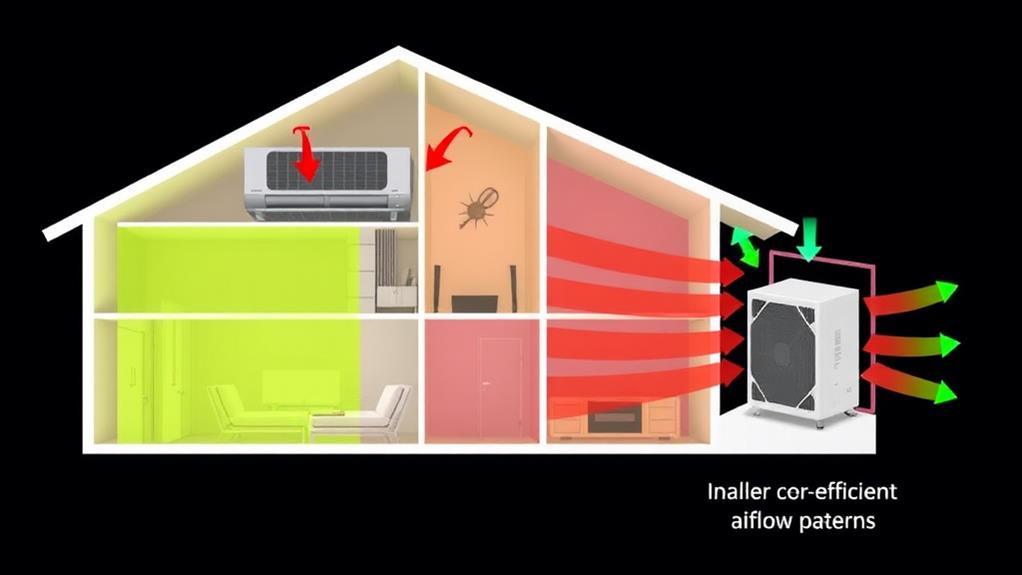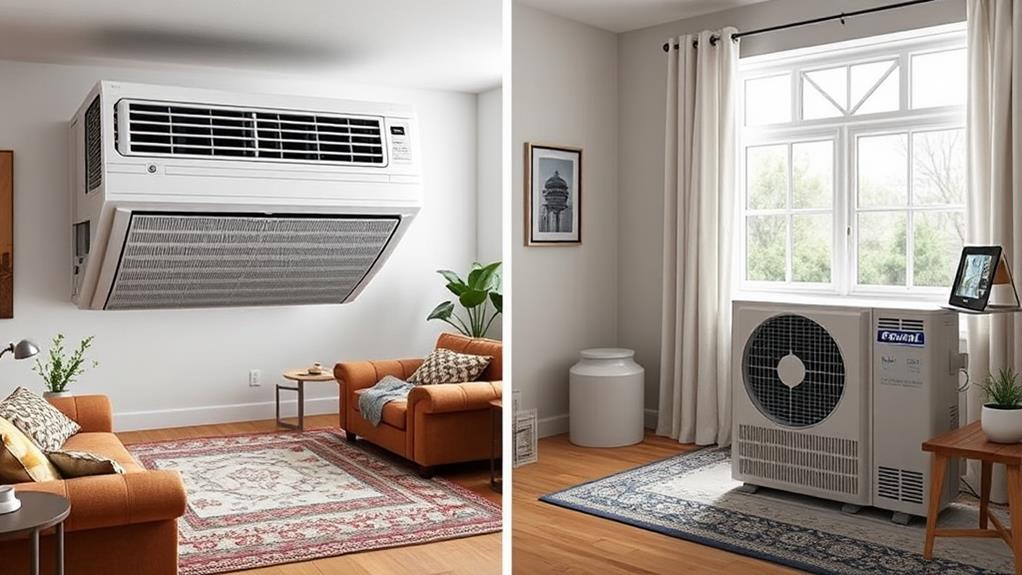When sizing your HVAC system, bigger isn't always better. While you might think a larger system will cool or heat your home faster, it can actually lead to problems. Oversized systems cycle on and off too frequently, reducing efficiency and comfort while increasing energy costs and wear on the equipment. Proper sizing considers factors like your home's square footage, insulation, climate, and occupancy. A correctly sized system will maintain consistent temperatures, remove humidity effectively, and operate efficiently. To determine the right size for your home, you'll need a professional load calculation. Understanding the importance of proper sizing can save you money and improve your comfort in the long run.
Understanding HVAC System Sizing

When it comes to HVAC system sizing, getting it right is crucial for your home's comfort and energy efficiency. Many homeowners mistakenly believe that bigger is better, but oversized systems can lead to a host of problems. To understand proper sizing, you'll need to consider several factors.
First, calculate your home's square footage and ceiling height. These measurements form the basis for determining the capacity needed. Next, factor in your climate zone, insulation quality, and the number and size of windows. Don't forget to account for heat-generating appliances and the number of occupants in your home.
A professional HVAC contractor will perform a Manual J load calculation to precisely determine your home's heating and cooling needs. This calculation considers all these factors and more to recommend the right-sized system. Remember, an appropriately sized HVAC system will cycle on and off less frequently, maintain consistent temperatures, and remove humidity more effectively. It'll also have a longer lifespan and use less energy, saving you money on utility bills and replacement costs. Don't rush this process – take the time to ensure your HVAC system is perfectly sized for your home's unique needs.
Consequences of Oversized Systems
While proper sizing is key, many homeowners still end up with oversized HVAC systems. This common mistake can lead to several issues that affect both your comfort and your wallet.
First, an oversized system will cycle on and off more frequently than necessary. This short-cycling reduces efficiency, increases energy consumption, and puts extra wear and tear on your equipment. You'll likely face higher utility bills and more frequent repairs as a result.
Oversized systems also struggle to dehumidify your home effectively. They cool the air too quickly, shutting off before removing enough moisture. This can leave you feeling clammy and uncomfortable, even when the temperature is right.
You might also notice uneven cooling throughout your home. Large systems can create cold spots near vents while leaving other areas insufficiently cooled. This temperature inconsistency can be frustrating and may lead you to adjust your thermostat more often, further increasing energy use.
Lastly, the initial cost of an oversized system is higher than necessary. You're paying for capacity you don't need, which means you're not getting the best value for your investment. To avoid these consequences, always work with a qualified HVAC professional to accurately size your system.
Benefits of Proper Sizing

Proper sizing of your HVAC system offers three key benefits. First, you'll enjoy improved comfort throughout your home. A correctly sized system will maintain consistent temperatures and humidity levels, eliminating hot and cold spots. It'll cycle on and off at the right intervals, preventing temperature swings and ensuring optimal air circulation.
Second, you'll save money on energy bills. An appropriately sized HVAC system operates more efficiently, using less energy to maintain your desired temperature. It won't waste power through short cycling or struggle to keep up with demand, resulting in lower monthly costs.
Lastly, you'll extend the lifespan of your equipment. A properly sized system experiences less wear and tear, as it doesn't have to work harder than necessary to heat or cool your space. This reduced strain means fewer breakdowns, less frequent repairs, and a longer overall lifespan for your HVAC unit.
Determining the Right Size
Several factors come into play when determining the right size for your HVAC system. The square footage of your home is a primary consideration, but it's not the only one. You'll need to account for ceiling height, insulation quality, number of windows, and their energy efficiency. The local climate and your home's orientation also impact sizing calculations.
A professional HVAC technician will perform a Manual J load calculation to accurately determine your home's heating and cooling needs. This comprehensive assessment considers heat gain and loss through walls, floors, ceilings, and windows. It also factors in internal heat sources like appliances and occupants.
Don't rely on rules of thumb or previous system sizes. Your home's energy efficiency may have changed over time, and older systems were often oversized. A properly sized system will cycle on and off less frequently, leading to better humidity control and energy efficiency.
Consider zoning your home if different areas have varying heating and cooling needs. This allows for smaller, more efficient units in each zone rather than one large system for the entire house. Remember, a correctly sized HVAC system ensures comfort, efficiency, and longevity.
Common Sizing Misconceptions

Misconceptions about HVAC sizing can lead homeowners astray when selecting a new system. One common myth is that bigger is always better. You might think a larger unit will cool or heat your home faster, but oversized systems actually perform less efficiently. They'll cycle on and off more frequently, leading to increased wear and tear, higher energy bills, and inconsistent temperatures.
Another misconception is that you should size your system based on square footage alone. While this is a starting point, it doesn't account for factors like ceiling height, insulation quality, or the number of windows in your home. These elements significantly impact your HVAC needs.
Some homeowners believe they should choose the same size system as their old one. However, if your previous unit wasn't properly sized or you've made home improvements since its installation, this approach could be flawed.
You might also think that a smaller system will save you money. While it may cost less upfront, an undersized unit will struggle to maintain comfortable temperatures, leading to higher energy costs and reduced lifespan.
Lastly, don't assume that HVAC sizing is a DIY task. Professional load calculations are crucial for determining the right size for your specific needs.
Conclusion
You've learned that bigger isn't always better when it comes to HVAC systems. By properly sizing your unit, you'll enjoy optimal comfort, energy efficiency, and cost savings. Don't fall for the misconception that oversizing provides better performance. Instead, trust in professional load calculations and your home's specific needs. Remember, a well-sized system will keep you comfortable year-round without breaking the bank. Embrace the truth: in HVAC, precision trumps power every time.

